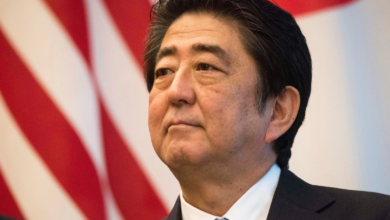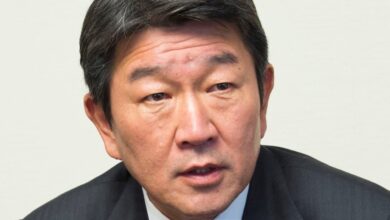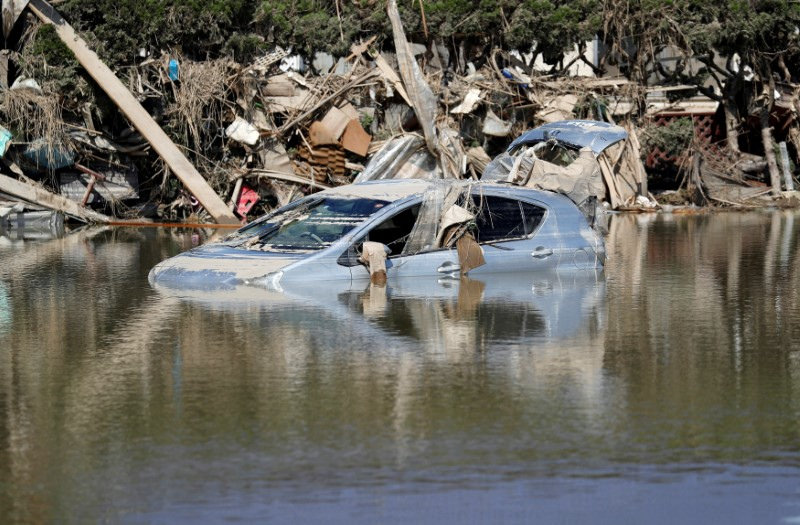The Fourth Japan-CARICOM Ministerial-Level Conference was held in Tokyo on 15th November 2014 with the participation of the Minister for Foreign Affairs of Japan and the Ministers of Foreign Affairs and other Heads of Delegations of the Member States of the Caribbean Community (CARICOM). The Minister for Foreign Affairs of Japan, Fumio Kishida and the Minister of Foreign Affairs of Guyana, The Honourable Carolyn Rodrigues-Birkett, served as Co-chairs.
On the occasion of the celebration of the commemoration of the Japan-CARICOM Friendship Year 2014, which marks the Twentieth Anniversary of relations between CARICOM and Japan, the Foreign Ministers reaffirmed their global partnership and mutual interests as island nations and low-lying coastal states, which face common challenges, and uphold shared basic values such as freedom, democracy, respect for basic human rights, and the rule of law, and committed to their countries’ continued contribution to betterment of the international community. They welcomed the increased level of exchanges in recent years and expressed their intention to keep up the momentum attained during the Friendship Year.
3. The Foreign Ministers also decided to actively follow up the successful First Japan-CARICOM Summit held in Trinidad and Tobago on 28th July 2014, which was co-chaired by H.E. Mr. Shinzo Abe, Prime Minister of Japan, and H.E. Mr. Gaston Browne, Prime Minister of Antigua and Barbuda and Chairman of the CARICOM Conference of Heads of Government. The Foreign Ministers resolved to strengthen the bond between Japan and CARICOM Member States and to cooperate in various areas related to three pillars: (1) cooperation towards sustainable development including overcoming vulnerabilities particular to Small Island Developing States (SIDS); (2) deepening and expanding bonds founded on exchanges and friendship; (3) cooperation in addressing challenges confronting the international community.
< First Pillar: Cooperation towards sustainable development including overcoming vulnerabilities particular to Small Island Developing States >
4 . Recognising that CARICOM Member States, as small islands and low lying coastal developing states, remain a special case for sustainable development in view of their unique and particular vulnerabilities and that they remain constrained in meeting their goals in achieving sustainable development, Foreign Minister Kishida reaffirmed Japan’s intention to actively engage in international discussions concerning vulnerabilities particular to Small Island Developing States. CARICOM Foreign Ministers expressed their concerns over the issue of graduation from concessionary funding based on the narrow measurement of GDP per capita and underlined the importance of expanding this measurement to include a vulnerability index. Foreign Minister Kishida noted that Japan will give utmost consideration to the concerns of CARICOM. The Foreign Minister also indicated that Japan will continue to extend its cooperation towards overcoming such vulnerabilities particular to CARICOM Member States utilising Japanese technologies and expertise nurtured through its similar experience in the fields of disaster risk reduction, countermeasures against environmental degradation, climate change, energy, waste management and fisheries amongst others.
CARICOM Foreign Ministers expressed appreciation for Japan’s solidarity and welcomed the fact that Japan has started a field survey in the area of renewable energy and energy efficiency, which is one of the key sectors to overcome inherent vulnerabilities particular to CARICOM Member States, such as their dependence on imported fossil fuels. They also welcomed other ongoing projects and field surveys to be conducted in priority areas for the Community. CARICOM Foreign Ministers also expressed appreciation for Japan’s recognition of the importance of assisting their countries from perspectives other than those based on per capita income, and expressed their expectation for close cooperation in that regard.
Reaffirming the importance of assistance through the Japan-CARICOM Friendship Fund, which is Japan’s public and private initiative since 2000, the Foreign Ministers decided to continue cooperation by further enhancing the effectiveness of the Fund, mindful of its flexible operation and possible synergy with other assistance programs.
<Second Pillar: Deepening and expanding bonds founded on exchanges and friendship>
Appreciating the efforts undertaken by public and private sectors during this Friendship Year to promote cultural understanding and realise exchanges at various levels, the Foreign Ministers affirmed their intention to maintain this momentum and to enhance mutual understanding and strengthen the bonds of friendship.
8. Recognising the successful achievement of exchange programmes such as the “Japan Exchange and Teaching (JET) Programme” and the “Invitation Program for Young Officials of the Caribbean Community”, the Foreign Ministers reaffirmed the intention to continue people-to-people exchanges including through these programmes.
9. Foreign Minister Kishida affirmed his intention to promote assistance for Japanese language education at the University of the West Indies (UWI), which plays a central role in promoting Japanese language education in CARICOM Member States, through strengthening cooperation with the Japan Foundation and through the use of Information and Communication Technologies (ICT).
10. The Foreign Ministers welcomed the hosting of the 2020 Olympic and Paralympic Games in Tokyo and expressed their best wishes to the athletes of Japan and CARICOM Member States at the Games. They also welcomed Japan’s efforts for the international cooperation scheme “Sport for Tomorrow” programme and affirmed that Japan and CARICOM will work together in fostering friendship and mutual understanding through sports.
11. Highlighting the rich tourism resources that exist in Japan and the significance of this sector to CARICOM Member States, the Foreign Ministers welcomed the participation of CARICOM Member States in the “Tourism EXPO JAPAN” in September 2014 utilising the Japan-CARICOM Friendship Fund, and called for promotion and cooperation in this area in order to increase tourism on both sides.
12. The Foreign Ministers recognised the importance of a mutually beneficial economic relationship. Bearing in mind that stable energy supply and clean energy, as well as Information Communication Technologies are key to economic development in CARICOM Member States, they welcomed investment and interest by Japanese enterprises in such fields. They also recognised that it is important to improve the business environment including infrastructure, capacity building, and affiliated industries in order to enhance trade and investment.
<Third Pillar: Cooperation in addressing challenges of the international community>
13. The Foreign Ministers emphasised the need to reform the United Nations Security Council (UNSC) in a way that reflects the geopolitical realities of the 21st Century. In particular, they stressed the need for the UNSC to increase its representativeness, effectiveness and transparency. Recognising that the positions of Japan and CARICOM on UNSC reform have much in common, they shared the view that they will strengthen their collaboration with a view to converging their positions to achieve concrete outcomes during the 70th anniversary of the UN in 2015.
14. Noting that Japan and CARICOM face common challenges pertaining to natural disasters, the Foreign Ministers reaffirmed the importance of mainstreaming disaster risk reduction in development planning and international cooperation initiatives. They affirmed their active participation in and close cooperation for the Third UN World Conference on Disaster Risk Reduction to be held in Sendai-City, Japan, in March 2015.
15. The Foreign Ministers reaffirmed their continuous cooperation for the achievement of the UN Millennium Development Goals (MDGs) by 2015 and shared the common recognition that the Post-2015 Development Agenda should be, based on the principle of human security, an effective framework to address challenges including disaster risk reduction, universal health coverage and gender equality and women’s empowerment. The Foreign Ministers also recognised that it is important to take into account not only elements such as per-capita income, but also inherent vulnerabilities particular to SIDS, including CARICOM Member States, in drawing up the new framework.
16. The Foreign Ministers reaffirmed their intention to continue close cooperation in the field of climate change, including cooperation to develop a Post-2020 framework applicable to all Parties under the UN Framework Convention on Climate Change. In that context, they reaffirmed their determination to achieve a successful outcome at the COP20 which will be held in Lima, Peru, in December 2014. Japan stressed the importance of Climate Change, Disaster Risk Reduction and Health and announced its support to SIDS by training 5,000 ‘actors’ over the next three years at the Third International Conference on Small Island Developing States (SIDS) in September 2014. CARICOM welcomed Japan’s Initiative to address the vulnerabilities of SIDS. Foreign Minister Kishida explained Japan’s position to place much value on assistance to SIDS, especially those vulnerable to climate change, and highlighted this position by announcing Japan's Adaptation Initiative at the UN Climate Change Summit in September 2014.
17. The Foreign Ministers shared the recognition that the seas and oceans should be open, free and secure, in accordance with international law including the United Nations Convention on the Law of the Sea (UNCLOS). They further reaffirmed that maritime order must be maintained and that common principles such as the freedom and safety of navigation and overflight, the renouncement of the threat or the use of force, and the peaceful settlement of disputes must be adhered to in accordance with the international law.
18. The Foreign Ministers affirmed, as countries surrounded by seas and oceans and enjoying their resources, the importance of the sustainable use of marine living resources based on the best scientific evidence available and proper management, and they will cooperate to gain wider support in this area.
19. The Foreign Ministers reaffirmed their commitment to nuclear disarmament, nuclear non-proliferation, and peaceful uses of nuclear energy, as well as the success of the Review Conference of the Parties to the Treaty on the Non-proliferation of Nuclear Weapons in 2015. They welcomed the entry into force of the Convention on Cluster Munitions in 2010 and the imminent entry into force of the Arms Trade Treaty, and affirmed the importance of their cooperation towards the universalisation of these treaties.
20. Foreign Minister Kishida explained Japan’s determination to contribute even more actively to ensuring peace, stability and prosperity in the international community from the policy of “Proactive Contribution to Peace” based on the principle of international cooperation, and explained its recent efforts. CARICOM Foreign Ministers welcomed and supported Japan’s efforts to contribute to the peace and stability of the world and reiterated their support for the renouncement of the threat or use of force as prohibited in the UN Charter and for the peaceful settlement of disputes. CARICOM Foreign Ministers also reaffirmed the Community’s commitment to regional peace through the CELAC Declaration on 29th January 2014, which designates the Caribbean and Latin America as a Zone of Peace, as well as to the Treaty of Tlatelolco, which established a nuclear weapon free zones in Latin America and the Caribbean.
21. The Foreign Ministers, recalling the concerns of the international community over North Korea’s continued development of nuclear weapons and ballistic missile programs, strongly urged North Korea to take concrete actions towards its denuclearization and to fully comply with its obligations under all relevant UN Security Council resolutions, and stressed the need for it to abide by the commitments made in the Joint Statement of the Fourth Round of the Six-Party Talks of the September 2005. They also urged North Korea to address the human rights and humanitarian concerns, including the abductions issue.
22. The Foreign Ministers reiterated their commitment to continue working towards the achievement of the objectives mentioned above and to further strengthen their coordination as global partners on issues of mutual concern within the international community. They also stressed the significance of high-level policy dialogues between Japan and CARICOM and reaffirmed their continued efforts to strengthen ties through enhanced communications and improved diplomatic channels.
23. CARICOM Foreign Ministers expressed their appreciation for the warm hospitality and excellent arrangements provided by the Government of Japan for the Fourth Japan-CARICOM Ministerial-Level Conference and their gratitude for the assistance given to date by Japan.





